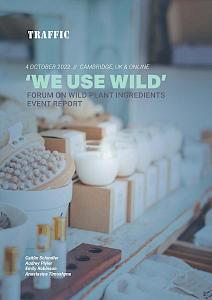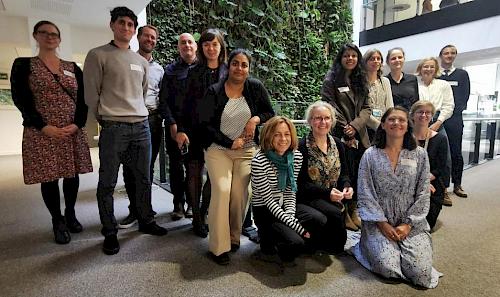How big brand collaboration can nurture sustainable trade of wild-harvested ingredients
The newly-launched WildCheck platform has already encouraged big brands to realise the benefits sustainable wild-harvested ingredients can have for local ecosystems and communities. TRAFFIC encourages others to follow and join forces with companies taking steps to ensure their supply chains have the best results for people and the planet.

The use of wild-harvested plants in medicine, foods and cosmetics goes back millennia. The demand is still growing, as the trade volume of medicinal and aromatic plant species has increased by 22% since 2000. As explored on the WildCheck platform and in the WildCheck report, through collaborative, non-competitive efforts, there are ecological and social opportunities to be gained for the environment and people who depend on harvesting these wild ingredients.
The collaborative buy-in from end-market stakeholders is necessary to adapt the competitive profit-oriented structure of wild plant sourcing in multiple industries.”
Caitlin Schindler, TRAFFIC Plants Trade Programme Manager

Encouragingly, big brands like the world-famous tea company Twinings and the second largest UK supermarket chain, Sainsbury's, are already diving deeper into the sourcing of wild-harvested ingredients on their shelves, including using the WildCheck platform.
In an intimate event attended by everyday brands from multiple industries last month, companies recognised how, as critical stakeholders in the wild plant supply chains, they have a role to play and acknowledged that there are challenges to overcome in the sustainable sourcing of ingredients. Business representatives took the opportunity to highlight their ongoing or newly-formed sustainable sourcing activities and discuss non-competitive potential avenues to mitigate overharvesting and mismanagement of wild species, as well as potential safety concerns and exploitation of harvesters.
Also attended by standard holding organisations, certification bodies and conservation NGOs, businesses were encouraged to form partnerships with other companies and organisations to help to share the costs and reduce duplicated efforts in addressing current knowledge gaps and action around wild plant ingredients.

Quotes from event attendees and businesses using the WildCheck Platform:
"While having a stable demand for wild ingredients is decisive for the communities that collect them, we have also the responsibility to ensure there is a concrete and positive impact for the communities behind them. Knowing exactly where and how our ingredients are being produced and collected is an essential part of that work, and any platform, database or group that can help us gain a better understanding brings us a step closer to the sustainable and transparent chain we envision.”
Hernan Zunino, Social Impact Manager, Latin America at Twinings“Cambridge Conservation Initiative is about bringing people together to collaboratively build answers to global conservation challenges. This workshop arranged by TRAFFIC brings the CCI institutions together with the biggest brands to chart the opportunities for shifting the sourcing of wild plant products towards a sustainable and regenerative industry. TRAFFIC, one of CCI’s 10 partners is a leader in wildlife trade and with particular expertise in wild plant products, exemplifies the skills of the CCI partners during this accelerating biodiversity crisis.
Mike Maunder, Executive Director of the Cambridge Conservation Initiative
We are ready to help guide companies in making robust progress toward fairer, safer and sustainable wild product supply chains that ultimately work towards various UN Sustainable Development Goals for the environment and support the 1.2 billion people that rely on nature for their basic needs.”
Caitlin Schindler, TRAFFIC Plants Trade Programme Manager

To show unity and commitment to responsible sourcing of wild-harvested ingredients, the attendees were encouraged to sign the We Use Wild Pledge.
The Pledge is a voluntary, self-led initiative to increase awareness and responsible sourcing of wild-harvested plant ingredients and provides an action framework. While the Wild Dozen ingredients offer a starting point, thousands of other plant species used in the medicinal, foods and cosmetics industries need examining.
This event took place just weeks ahead of the 19th meeting of the Conference of the Parties to CITES (the Convention on International Trade in Endangered Species of Wild Fauna and Flora), where TRAFFIC experts will discuss the benefits of innovative approaches, like WildCheck, to the management and sustainability of trade in CITES-listed medicinal and aromatic plants.

Read the WildCheck Blog for tips, experience, and advice on responsibly sourcing wild plant ingredients, from organisations who have signed the We Use Wild Pledge.
Notes:
- WildCheck platform is part of TRAFFIC's Wild at Home Project and was built using information from the 2022 report WildCheck: Assessing risks and opportunities of trade in wild plant ingredients report.
- WildCheck is an online knowledge and collaboration platform that offers objective insights and advice on sourcing wild ingredients to support business, investment, and policy scoping, as well as consumer education. WildCheck connects a broad set of partners in their commitment to responsibly-sourced wild ingredients through the We Use Wild Pledge.
- Wild at Home Project: Using Markets for Wild Ingredients to Support Conservation and Rural Livelihoods https://www.traffic.org/what-we-do/projects-and-approaches/promoting-sustainable-trade/wild-at-home/
Acknowledgements
TRAFFIC's Wild at Home project is generously funded by the Swedish Postcode Foundation.
About Swedish Postcode Foundation
The Swedish Postcode Lottery believes that a strong civil society is essential for creating a better world. The Postcode Foundation’s goal is to carry out that mission through projects that challenge, inspire and promote change.




